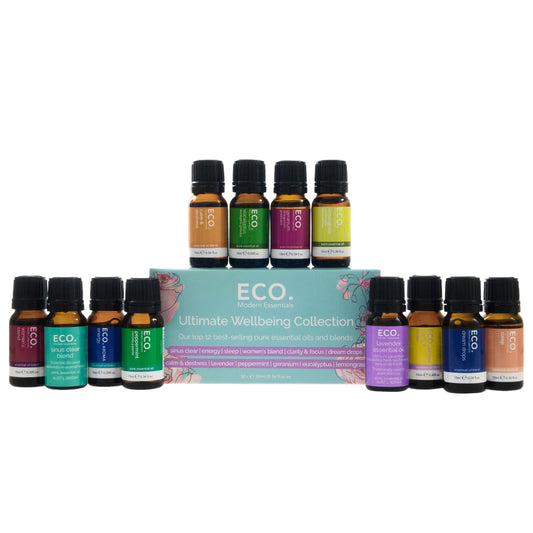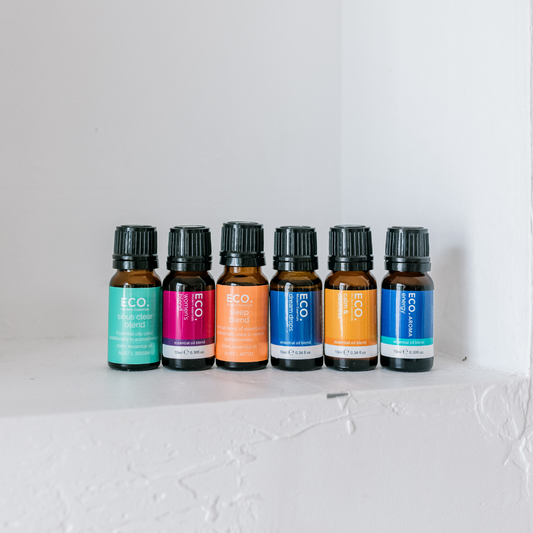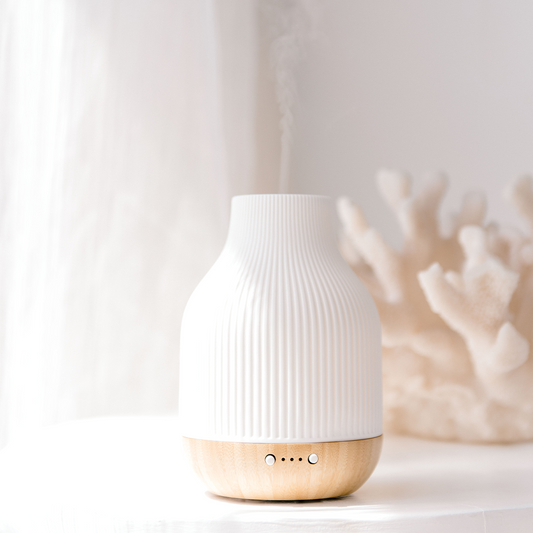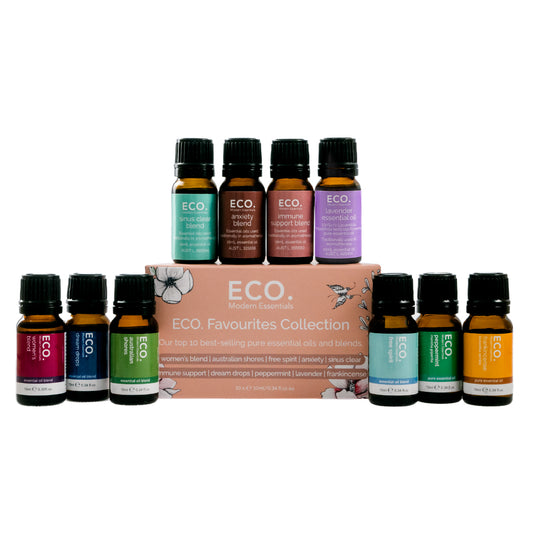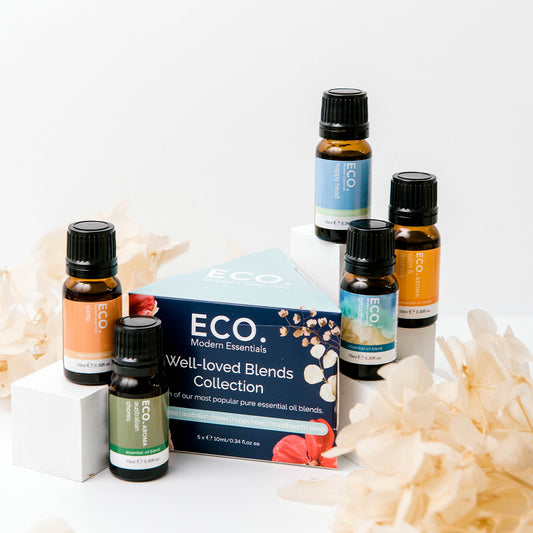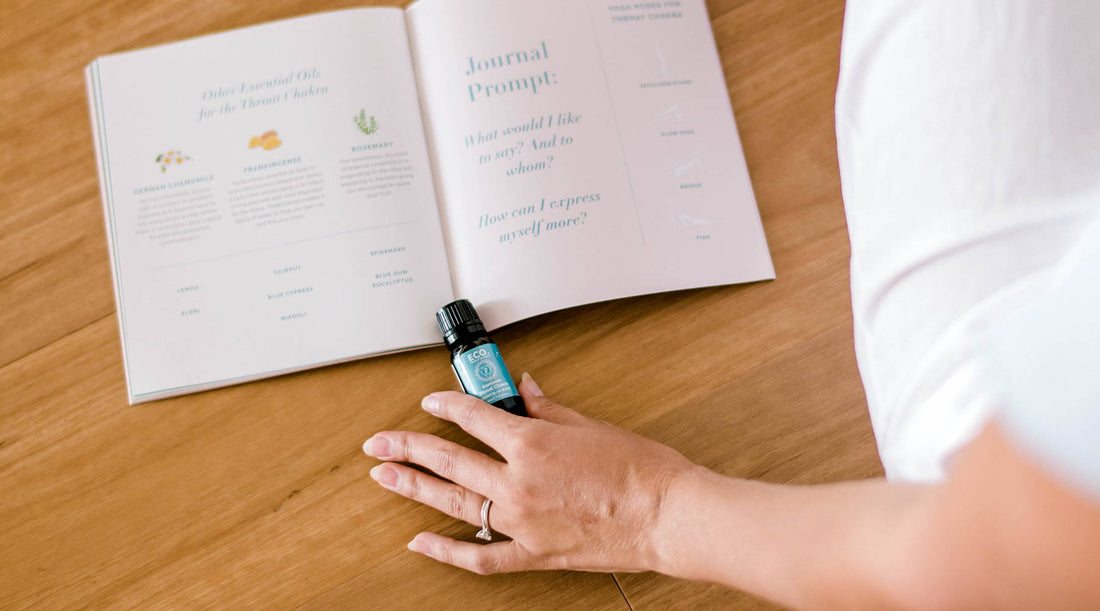
Benefits & Uses of Niaouli Essential Oil
Melaleuca trees have given us some powerfully healing essential oils.Niaouli is a cousin to the famous Tea Tree (Melaleuca alternifolia) and the lesser known Cajeput (Melaleuca cajeputi). Recent research into these essential oils found that their strong antimicrobial action is due to their unique chemical composition. Niaouli is a sweeter alternative to Eucalyptus and Tea Tree, making it a valuable addition to your aromatic first aid kit.
Where is Niaouli essential oil from?
Our Niaouli essential oil is sourced from Madagascar. Niaouli essential oil produced here is prized for its superior therapeutic quality due to the growing conditions in this region.M. quinquenervia trees also grow in New Caledonia and along the East coast of Australia from New South Wales up to Northern Queensland.
How is Niaouli essential oil made?
The leaves are steam distilled to extract Niaouli essential oil. The leaves and sometimes the twigs of the plant are collected and allowed to dry slightly for a few hours. Once dried they are placed in a vat. Steam is pumped into the vat and the aromatic molecules in the plant evaporate. The steam rises and is collected in cooling tubes. The cooled steam returns to liquid form. The liquid contains essential oil and hydrosol, commonly known as floral water. Both essential oil and hydrosol are used for therapeutic and other commercial purposes. It takes around 1kg of plant material to produce 6 to 10 mls of Niaouli essential oil.
What does Niaouli tree look like?
M. quinquenervia is native to Australia, French Polynesian Islands, and Papua New Guinea. An evergreen green that can grow to 25 meters tall, it prefers swamy and wet conditions. The tree has papery bark that is white and grey. Its leaves are pointy, and it produces white bottlebrush shaped flowers.M. quinquenervia is a hardy tree that recovers quickly after bushfires. It produces so many seeds that it can become invasive over time. Due to its quick cultivation and strength, this tree is a valuable commercial crop. On the endangered plant species list, M. quinquenervia is considered safe from extinction, making Niaouli essential oil an environmentally sustainable choice.
What does Niaouli essential oil smell like?
Niaouli essential oil has a refreshing scent that reminds us of Eucalyptus trees after a storm. The fragrance has a strong camphor note that is tempered with a sweetness and a quiet undertone of coffee and cardamom spice.
History of Niaouli
Traditionally, in communities where the trees grew abundantly, babies were wrapped in the bark of the tree to help protect them and to give them strength. The leaves were crushed in water and drunk as a tea to treat headaches, colds, and general sickness. Captain James Cook gave the tree its botanical name during an expedition to Australia in the mid 1700s. Later in the 1900s, coffee pickers in New Caledonia were seen using the bark to cover wounds to prevent infections by European settlers. This sparked an interest in the medicinal uses of the tree. Eventually, the essential oil was distilled and researchers realised its purifying and disinfecting properties. Niaouli essential oil was used as a surface disinfectant in hospitals around France at this time.
Today, Niaouli essential oil is added to many medicinal products such as cold and flu remedies and dental hygiene products.It may also be added to commercial cleaning products. The essential oil is prized for its medicinal value and is used in aromatherapy and clinical aromatology treatments.
Benefits & uses of Niaouli essential oil:
- Disinfectant: like its cousin Tea Tree, Niaouli has anti-septic and anti-bacterial properties, perfect for disinfecting cuts, wounds, and surfaces.
- Expectorant: with high 1,8 cineole levels, Niaouli is an expectorant which helps clear the lungs and sinuses by thinning mucous making it an excellent choice for colds, flu, and other chest infections.
- Hayfever: helps improve respiratory symptoms of allergies during hayfever and chronic asthma with a mild anti-allergenic action.
- Wounds: cleans and promotes wound healing with antiseptic properties. Assists in closing wounds with cicatrisant and vulnerary actions.
- Muscles and joints: massage a Niaouli blend into sore muscles to help relieve pain from exercise, household chores and gardening. Excellent to reduce arthritic pain and stiffness.
- Skin care: Perfect to help clear acne outbreaks and treat other skin infections such as boils.
- Mental Clarity: Clears the mind and lifts the fog of mental fatigue.Perfect to diffuse in the office or home study.
How to use Niaouli essential oil
- Diffuser: Add 6-8 drops of Niaouli essential oil to a diffuser for a natural air antiseptic to reduce the spread of airborne germs. A few drops of citrus essential oil such as Lemon or Lime also boost the air antiseptic property of Niaouli.
- Quick fix: A few deep inhalations from the bottle can help clear lung congestion and help with a blocked nosed associated with allergies.
- Shower: Add a few drops of Niaouli to a face-washer and place in the corner of the shower. The heat from the water will cause the essential oil to evaporate creating a steam bath that is clearing to the lungs and sinuses.
- Compress: To treat skin infection. Add 2 -3 drops of Niaouli to a bowl of very warm water. Soak a face washer and wring out excess water. Place the face washer over affected area, such as acne outbreak, in-grown hair, or boils. Remove and replace once face washer has cooled. Repeat several times.
- Massage: Use a 2.5% dilution; 50 drops in 100ml carrier oil. Massage into sore muscles and joints to reduce stiffness and improve muscular recovery after exercise.
- Hand or foot bath: Add 2 drops of Niaouli to a bowl of water. May aid in the treatment of open wounds and arthritis.
- Steam: Add 1 to 2 drops of Niaouli essential oil to a bowl of steaming hot water. Lean close to the bowl and breath deeply for several minutes, to help clear lung and sinus congestion. Niaouli steam treatment also aids in the management of acne prone skin.
- Clean: Add 6 drops of Niaouli to your washing machine to freshen clothes, add to cleaning products to disinfect toilet, bathroom, and floors.
- Blends well with: The strong distinctive aroma of Niaouli blends well with other camphorous tones as well as strong citruses and other herbals.Sweet and gentle florals may get lost in a blend with powerful Niaouli. Try blending with Basil, Black Pepper, Citronella, Eucalyptus, Grapefruit, Kunzea, Lemongrass, Lemon Myrtle, May Chang, Peppermint, Pine, Rosemary, Spanish Marjoram, Spearmint, Tea Tree, and Thyme.
Niaouli essential oil safety
Considered to be safe for use, Niaouli has been found to be non-irritating or sensitizing to the skin.





